第三单元答案
四年级上册语文第三单元试卷答案【含答案】
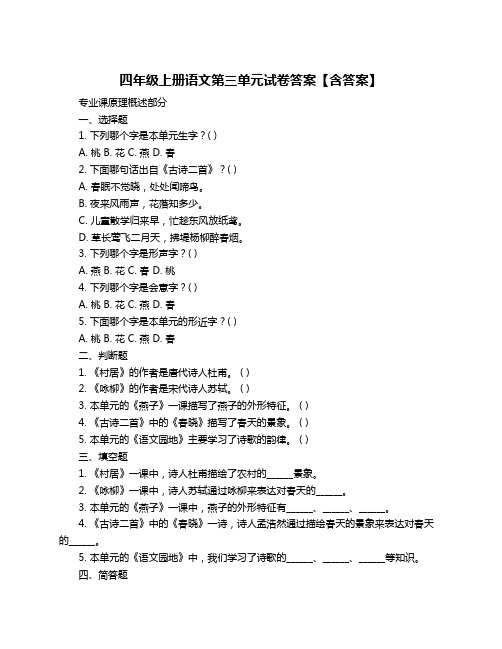
四年级上册语文第三单元试卷答案【含答案】专业课原理概述部分一、选择题1. 下列哪个字是本单元生字?( )A. 桃B. 花C. 燕D. 春2. 下面哪句话出自《古诗二首》?( )A. 春眠不觉晓,处处闻啼鸟。
B. 夜来风雨声,花落知多少。
C. 儿童散学归来早,忙趁东风放纸鸢。
D. 草长莺飞二月天,拂堤杨柳醉春烟。
3. 下列哪个字是形声字?( )A. 燕B. 花C. 春D. 桃4. 下列哪个字是会意字?( )A. 桃B. 花C. 燕D. 春5. 下面哪个字是本单元的形近字?( )A. 桃B. 花C. 燕D. 春二、判断题1. 《村居》的作者是唐代诗人杜甫。
( )2. 《咏柳》的作者是宋代诗人苏轼。
( )3. 本单元的《燕子》一课描写了燕子的外形特征。
( )4. 《古诗二首》中的《春晓》描写了春天的景象。
( )5. 本单元的《语文园地》主要学习了诗歌的韵律。
( )三、填空题1. 《村居》一课中,诗人杜甫描绘了农村的______景象。
2. 《咏柳》一课中,诗人苏轼通过咏柳来表达对春天的______。
3. 本单元的《燕子》一课中,燕子的外形特征有______、______、______。
4. 《古诗二首》中的《春晓》一诗,诗人孟浩然通过描绘春天的景象来表达对春天的______。
5. 本单元的《语文园地》中,我们学习了诗歌的______、______、______等知识。
四、简答题1. 请简要介绍《村居》一课的主题。
2. 请简要介绍《咏柳》一课的主题。
3. 请简要介绍《燕子》一课中燕子的外形特征。
4. 请简要介绍《古诗二首》中的《春晓》一诗的主题。
5. 请简要介绍本单元《语文园地》学习的内容。
五、应用题1. 请用本单元学过的词语造句。
2. 请用本单元学过的诗句写一段话。
3. 请用本单元学过的知识解释下列句子中的词语。
4. 请用本单元学过的知识解释下列句子中的修辞手法。
5. 请用本单元学过的知识解释下列句子中的标点符号用法。
2023-2024学年六年级上册语文第三单元测试含答案

2023-2024学年六年级上册语文第三单元测试含答案一、积累与运用1.根据语境,给加点的词语选择正确的解释。
勉强:①能力不够还尽力做。
②不是心甘情愿的。
③使人做他自己不愿意做的事。
④牵强;理由不充足。
⑤将就;凑合。
(1)这项工作我还能勉强..坚持下来。
(2)他不去就算了,不要勉强..他了。
(3)渔夫和他的妻子从早到晚地干活,还只能勉强..填饱肚子。
(4)我请他帮忙,他碍于情面勉强..答应了。
2.按要求写词语。
(1)写出近义词。
舒适—强制—沉思—(2)写出反义词。
伟大—温柔—破坏—安静—(3)写出表示心理活动的词语:(4)写出表示神态的词语:(5)写出AABB式的词语:3.指出下面句子所使用的说明方法。
(1)金星是一颗缺氧、缺水,有着浓厚云层的行星。
(2)木星,土星,天王星和海王星离太阳很远,它们的表面温度,一般都低于零下一百四十摄氏度。
(3)弯弯的金水河像一条玉带横贯东西。
(4)太和殿是举行重大典礼的地方,皇帝即位、生日、婚礼和元旦等,都在这里接受朝贺。
4.课文欢乐谷。
(1)《竹节人》一课通过对竹节人、竹节人以及老师竹节人却自己偷偷玩竹节人的描写,表现了的乐趣,表达了儿童的喜悦和满足。
(2)《宇宙生命之谜》一课首先提出疑问“”,然后陈述生命存在的个条件,接着对地球以外的太阳系的其他行星进行分析,其中着重写了人们对的探索,说明这些行星上。
5.请将正确的词语序号填入相应的横线上。
①技高一筹②虎视眈眈③弄巧成拙④怒气冲冲⑤别出心裁⑥津津有味⑦沧海一粟⑧井然有序Ⅰ 还有同学,想,给竹节人做了一个脑袋和一套纸盔甲,没想到,中看不中用。
Ⅰ 我们在课堂上,将课本竖在面前当屏风,继续地偷偷玩竹节人,被那的老师看出了破绽。
他大步流星走过来,伸手一拂,“屏风”颓然倒了,一切秘密暴露无遗。
Ⅰ 银河系是宇宙的。
Ⅰ 故宫,重重殿宇,层层楼阁,道道宫墙,错综相连,而。
6.根据要求,完成句子练习。
(1)弯弯的金水河像一条玉带横贯东西,河上是五座精美的汉白玉石桥。
七年级上册 第三单元参考答案
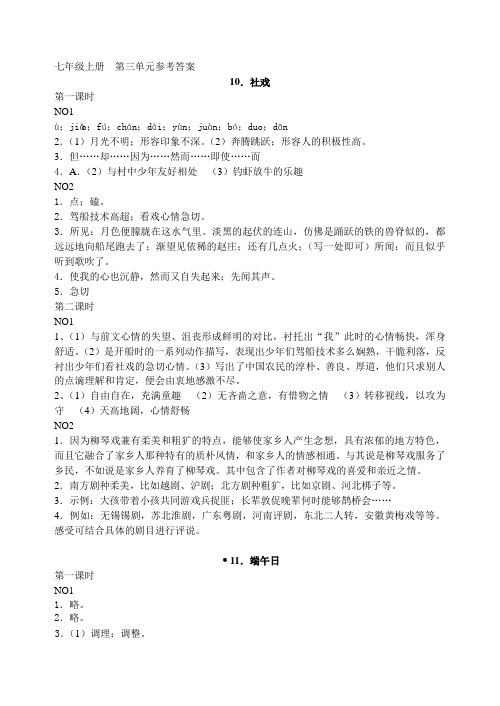
七年级上册第三单元参考答案10.社戏第一课时NO1ù;jiǎo;fú;chán;dài;yùn;juàn;bó;duo;dān2.(1)月光不明;形容印象不深。
(2)奔腾跳跃;形容人的积极性高。
3.但……却……因为……然而……即使……而4.A.(2)与村中少年友好相处(3)钓虾放牛的乐趣NO21.点;磕。
2.驾船技术高超;看戏心情急切。
3.所见:月色便朦胧在这水气里。
淡黑的起伏的连山,仿佛是踊跃的铁的兽脊似的,都远远地向船尾跑去了;渐望见依稀的赵庄;还有几点火;(写一处即可)所闻:而且似乎听到歌吹了。
4.使我的心也沉静,然而又自失起来;先闻其声。
5.急切第二课时NO11、(1)与前文心情的失望、沮丧形成鲜明的对比,衬托出“我”此时的心情畅快,浑身舒适。
(2)是开船时的一系列动作描写,表现出少年们驾船技术多么娴熟,干脆利落,反衬出少年们看社戏的急切心情。
(3)写出了中国农民的淳朴、善良、厚道,他们只求别人的点滴理解和肯定,便会由衷地感激不尽。
2、(1)自由自在,充满童趣(2)无吝啬之意,有惜物之情(3)转移视线,以攻为守(4)天高地阔,心情舒畅NO21.因为柳琴戏兼有柔美和粗犷的特点,能够使家乡人产生念想,具有浓郁的地方特色,而且它融合了家乡人那种特有的质朴风情,和家乡人的情感相通。
与其说是柳琴戏服务了乡民,不如说是家乡人养育了柳琴戏。
其中包含了作者对柳琴戏的喜爱和亲近之情。
2.南方剧种柔美,比如越剧、沪剧;北方剧种粗犷,比如京剧、河北梆子等。
3.示例:大孩带着小孩共同游戏兵捉匪;长辈敦促晚辈何时能够鹊桥会……4.例如:无锡锡剧,苏北淮剧,广东粤剧,河南评剧,东北二人转,安徽黄梅戏等等。
感受可结合具体的剧目进行评说。
﹡11.端午日第一课时NO11.略。
2.略。
3.(1)调理:调整。
(2)呐喊助威:大声喊叫,帮助增加声势。
(3)伶俐:聪明,灵活。
政治经济学第三单元参考答案
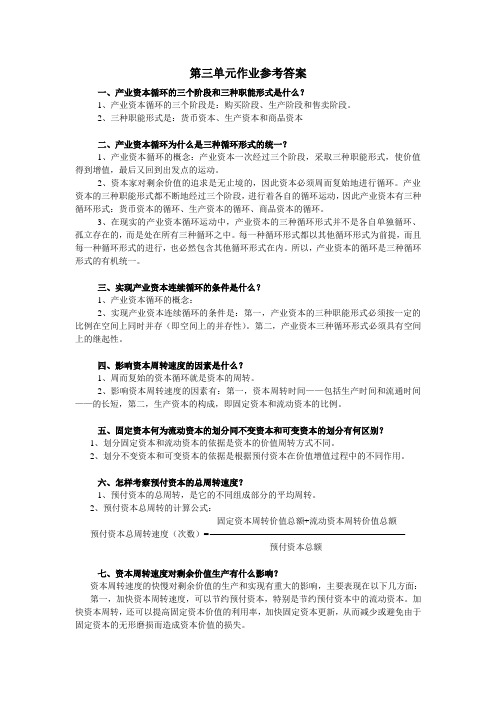
第三单元作业参考答案一、产业资本循环的三个阶段和三种职能形式是什么?1、产业资本循环的三个阶段是:购买阶段、生产阶段和售卖阶段。
2、三种职能形式是:货币资本、生产资本和商品资本二、产业资本循环为什么是三种循环形式的统一?1、产业资本循环的概念:产业资本一次经过三个阶段,采取三种职能形式,使价值得到增值,最后又回到出发点的运动。
2、资本家对剩余价值的追求是无止境的,因此资本必须周而复始地进行循环。
产业资本的三种职能形式都不断地经过三个阶段,进行着各自的循环运动,因此产业资本有三种循环形式:货币资本的循环、生产资本的循环、商品资本的循环。
3、在现实的产业资本循环运动中,产业资本的三种循环形式并不是各自单独循环、孤立存在的,而是处在所有三种循环之中。
每一种循环形式都以其他循环形式为前提,而且每一种循环形式的进行,也必然包含其他循环形式在内。
所以,产业资本的循环是三种循环形式的有机统一。
三、实现产业资本连续循环的条件是什么?1、产业资本循环的概念:2、实现产业资本连续循环的条件是:第一,产业资本的三种职能形式必须按一定的比例在空间上同时并存(即空间上的并存性)。
第二,产业资本三种循环形式必须具有空间上的继起性。
四、影响资本周转速度的因素是什么?1、周而复始的资本循环就是资本的周转。
2、影响资本周转速度的因素有:第一,资本周转时间——包括生产时间和流通时间——的长短,第二,生产资本的构成,即固定资本和流动资本的比例。
五、固定资本何为流动资本的划分同不变资本和可变资本的划分有何区别?1、划分固定资本和流动资本的依据是资本的价值周转方式不同。
2、划分不变资本和可变资本的依据是根据预付资本在价值增值过程中的不同作用。
六、怎样考察预付资本的总周转速度?1、预付资本的总周转,是它的不同组成部分的平均周转。
2、预付资本总周转的计算公式:固定资本周转价值总额+流动资本周转价值总额预付资本总周转速度(次数)=预付资本总额七、资本周转速度对剩余价值生产有什么影响?资本周转速度的快慢对剩余价值的生产和实现有重大的影响,主要表现在以下几方面:第一,加快资本周转速度,可以节约预付资本,特别是节约预付资本中的流动资本。
小学五年级《语文》第三单元测试题答案

小学五年级《语文》第三单元测试题答案一、基础知识。
(共15题;共100分)1.看拼音写词语。
zūn jìng wēi ruò chí yí bēng tā fā shì尊敬微弱迟疑崩塌发誓bēi tòng wǎn xiá yóu yǒng jiāo jí chóu xiè悲痛晚霞游泳交集酬谢2.给下面下划线字选择正确的读音。
发誓(shì sì)___shì_____ 着急(zhē zhāo)____zhāo____内蒙古(mēnɡ měnɡ)__měnɡ___ 苦难(nán nàn)___nàn__衰老(suāi shuāi)___shuāi_____ 瞌睡(kēɡē)____kē____酝酿(liànɡ niànɡ)____niànɡ____ 执拗(yòu niù)___niù___3.找出下面的错别字,将序号写在括号内。
( B )A. 谎话B. 蹦塌C. 历害D. 珊瑚4.找出下面的错别字,将序号写在括号内。
( A )A. 告秘B. 衣裳C. 铺扇D. 惩罚5.找出下面的错别字,将序号写在括号内。
( C )A. 梳头B. 流传C. 崔促D. 喜雀6.找出下面的错别字,将序号写在括号内。
( D )A. 发誓B. 感激C. 叮嘱D. 记念7.选字组词。
(1)慌谎 __谎__话 __慌__张 __慌__忙 __谎__言(2)诲悔教__诲__ 后__悔__ 劝__诲__ 反__悔__ (3)泳咏歌__咏__ 游__泳__ __泳__衣 __咏__唱8.下列词语中下划线字的解释有错误的一项是( C )A. 千真万确确:符合事实的B. 相依为命依:靠,仰赖C. 震天动地震:惊恐或情绪过分激动D. 恋恋不舍舍:放弃,不要了9.选择合适的关联词语填空。
第三单元综合卷答案

一.选择题:1、2009年10月1日,中华人民共和国庆祝建国60周年举行盛大的阅兵式。
每年7月4日,美国人民都会载歌载舞欢度国庆,下列文件中宣告美利坚合众国成立的是A.《权利法案》B.《独立宣言》 C.《人权宣言》 D.《联邦宪法》2、“我们已决心与如此不公正不通人道的国家一刀两断,我们采取这一必然会促使我们幸福的步骤,是完全应该的。
”(华盛顿1776年)这个“不通人道的国家”是指谁A.美国 B.英国 C.意大利 D.法国3、为了和上题中所讲的这个“不公正不通人道的国家一刀两断”,这个国家采取了什么行动?A.海地独立战争 B.英国资产阶级革命C.北美独立战争 D.法国大革命4、按时间先后顺序排列由华盛顿亲自领导并获胜的战役有:①波士顿战役②约克镇大捷③萨拉托加大捷④土伦战役⑤普林斯顿战役A. ①③⑤②④B.①②⑤C.①⑤②D. ①⑤③④②5、华盛顿主持修订的美国《联邦宪法》体现了法国哪位启蒙思想家的什么观点?A.卢梭的社会契约论B.伏尔泰的开明君主说C.卢梭的三权分立说D.孟德斯鸠三权分立说6、华盛顿被部下称为“战争时期的第一人”,其原因包括:①领导独立战争赢得了民族独立②1781年在约克镇接受康华利将军投降③就任大陆军总司令④主持制定《联邦宪法》A.①②③ B.①②④ C.①③④ D.②③④7、在华盛顿的首届任期内,他①创立美国总统连任不超过两届的范例②网罗人才,组成内阁③实行三权分立原则④创立了总统否决权制度A.①②B.②④ C.③④ D.①④8、1787年华盛顿主持制定了美国联邦宪法,下列有关《联邦宪法》的说法正确的是①确立了美国是联邦制国家②确定中央政府的权力构建采取三权分立的原则③使得美国的妇女和奴隶享有了充分的民主权利④是近代世界上第一部成文宪法A.①②③ B.②③④ C.①③④D.①②④9、1796年华盛顿在告别辞中说,“我们对待外国应该遵循的最高行动准则是在扩大我们的贸易关系时,应该尽可能避免政治上的联系。
部编人教版七年级语文上册 第三单元(含答案)
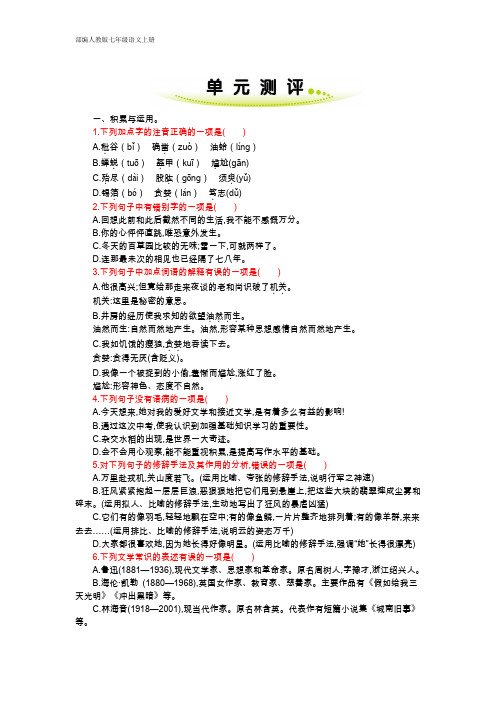
一、积累与运用。
1.下列加点字的注音正确的一项是( )A.秕.谷(bǐ)确凿.(zuò)油蛉(líng)B.蝉蜕.(tuō)盔.甲(kuī)尴.尬(ɡān)C.殆.尽(dài)股肱.(gōng)须臾.(yǔ)D.锡箔.(bó)贪婪.(lán)笃.志(dǔ)2.下列句子中有错别字的一项是( )A.回想此前和此后截然不同的生活,我不能不感慨万分。
B.你的心怦怦直跳,唯恐意外发生。
C.冬天的百草园比较的无味;雪一下,可就两样了。
D.连那最未次的相见也已经隔了七八年。
3.下列句子中加点词语的解释有误的一项是( )A.他很高兴;但竟给那走来夜谈的老和尚识破了机关..。
机关:这里是秘密的意思。
B.井房的经历使我求知的欲望油然而生....。
油然而生:自然而然地产生。
油然,形容某种思想感情自然而然地产生。
C.我如饥饿的瘦狼,贪婪..地吞读下去。
贪婪:贪得无厌(含贬义)。
D.我像一个被捉到的小偷,羞惭而尴尬..,涨红了脸。
尴尬:形容神色、态度不自然。
4.下列句子没有语病的一项是( )A.今天想来,她对我的爱好文学和接近文学,是有着多么有益的影响!B.通过这次中考,使我认识到加强基础知识学习的重要性。
C.杂交水稻的出现,是世界一大奇迹。
D.会不会用心观察,能不能重视积累,是提高写作水平的基础。
5.对下列句子的修辞手法及其作用的分析,错误的一项是( )A.万里赴戎机,关山度若飞。
(运用比喻、夸张的修辞手法,说明行军之神速)B.狂风紧紧抱起一层层巨浪,恶狠狠地把它们甩到悬崖上,把这些大块的翡翠摔成尘雾和碎末。
(运用拟人、比喻的修辞手法,生动地写出了狂风的暴虐凶猛)C.它们有的像羽毛,轻轻地飘在空中;有的像鱼鳞,一片片整齐地排列着;有的像羊群,来来去去……(运用排比、比喻的修辞手法,说明云的姿态万千)D.大家都很喜欢她,因为她长得好像明星。
(运用比喻的修辞手法,强调“她”长得很漂亮)6.下列文学常识的表述有误的一项是( )A.鲁迅(1881—1936),现代文学家、思想家和革命家。
第三单元配套练习答案
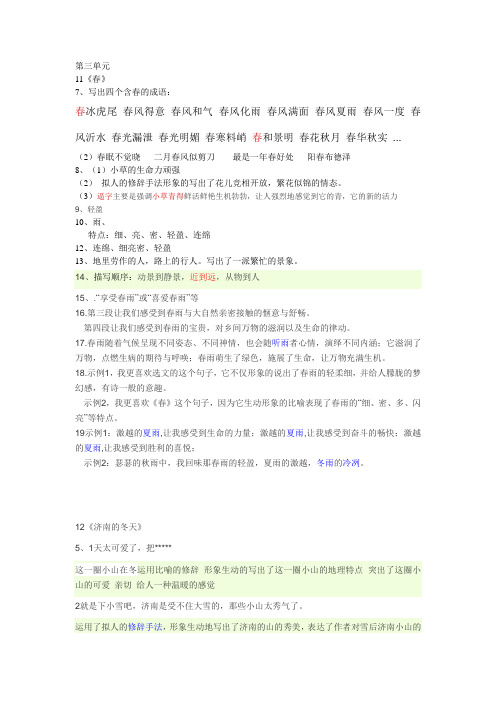
第三单元11《春》7、写出四个含春的成语:春冰虎尾春风得意春风和气春风化雨春风满面春风夏雨春风一度春风沂水春光漏泄春光明媚春寒料峭春和景明春花秋月春华秋实 ...(2)春眠不觉晓二月春风似剪刀最是一年春好处阳春布德泽8、(1)小草的生命力顽强(2)拟人的修辞手法形象的写出了花儿竞相开放,繁花似锦的情态。
(3)逼字主要是强调小草青得鲜活鲜艳生机勃勃,让人强烈地感觉到它的青,它的新的活力9、轻盈10、雨、特点:细、亮、密、轻盈、连绵12、连绵、细亮密、轻盈13、地里劳作的人,路上的行人。
写出了一派繁忙的景象。
14、描写顺序:动景到静景,近到远,从物到人15、.“享受春雨”或“喜爱春雨”等16.第三段让我们感受到春雨与大自然亲密接触的惬意与舒畅。
第四段让我们感受到春雨的宝贵,对乡间万物的滋润以及生命的律动。
17.春雨随着气候呈现不同姿态、不同神情,也会随听雨者心情,演绎不同内涵;它滋润了万物,点燃生病的期待与呼唤;春雨萌生了绿色,施展了生命,让万物充满生机。
18.示例1,我更喜欢选文的这个句子,它不仅形象的说出了春雨的轻柔细,并给人朦胧的梦幻感,有诗一般的意趣。
示例2,我更喜欢《春》这个句子,因为它生动形象的比喻表现了春雨的“细、密、多、闪亮”等特点。
19示例1:激越的夏雨,让我感受到生命的力量;激越的夏雨,让我感受到奋斗的畅快;激越的夏雨,让我感受到胜利的喜悦;示例2:瑟瑟的秋雨中,我回味那春雨的轻盈,夏雨的激越,冬雨的冷冽。
12《济南的冬天》5、1天太可爱了,把*****这一圈小山在冬运用比喻的修辞形象生动的写出了这一圈小山的地理特点突出了这圈小山的可爱亲切给人一种温暖的感觉2就是下小雪吧,济南是受不住大雪的,那些小山太秀气了。
运用了拟人的修辞手法,形象生动地写出了济南的山的秀美,表达了作者对雪后济南小山的喜爱与赞美之情。
3、有这样慈善的冬天,干啥还希望别的呢因为这里是拟人的手法,形象写出济南的冬天温情是对人们的善举。
劳动教育第三单元测试答案
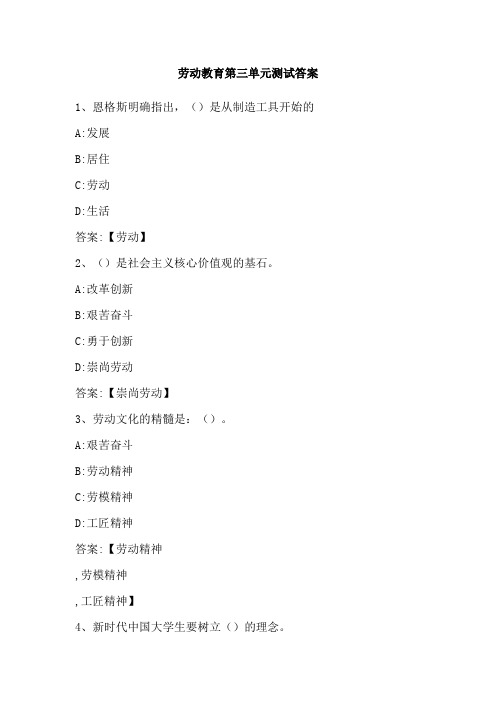
劳动教育第三单元测试答案1、恩格斯明确指出,()是从制造工具开始的A:发展
B:居住
C:劳动
D:生活
答案:【劳动】
2、()是社会主义核心价值观的基石。
A:改革创新
B:艰苦奋斗
C:勇于创新
D:崇尚劳动
答案:【崇尚劳动】
3、劳动文化的精髓是:()。
A:艰苦奋斗
B:劳动精神
C:劳模精神
D:工匠精神
答案:【劳动精神
,劳模精神
,工匠精神】
4、新时代中国大学生要树立()的理念。
A:劳动最美丽
B:劳动最光荣
C:劳动最崇高
D:劳动最伟大
答案:【劳动最美丽
,劳动最光荣
,劳动最崇高
,劳动最伟大】
5、劳动的完善程度是与文化在其中的渗透成正比的。
()A:错
B:对
答案:【对】。
第三单元答案知训答案(最新版)

C. 增加小车质量
7. 在讨论、确定小车的设计方案和绘制设计图环节,以下做法不可取的是( C )。
A. 从多个角度画出小车,可以更全面地反映它的结构
B. 画出小车主要部位的结构,最好进行必要的标注
C. 各部位的连接方式不需要提前设计,制作过程中可以一边制作一边思考
8. 要设计一辆能连续运动10分钟以上的小车,比较合适的动力装置是( A )。
A. 增加垫圈数量
B. 增加小车的载重
C. 更换粗糙的跑道
5. 小智在用橡皮筋驱动小车时,发现轮子打滑。可行的解决办法是( A )。
A. 增加橡皮筋的根数 B. 增加小车质量 C. 增加橡皮筋缠绕的圈数
6. 小智想让气球动力小车行驶得远一些,以下方法可行的是( A )。
A. 把气球吹得大一些
B. 把气球吹得小一些
A. 运动物体具有的能量与运动速度大小无关
B. 坡度越大,小车滑到斜面底部的速度越小
C. 物体运动的速度越大,撞击木块的距离越远,具有的能量越大
C. 车轮受到的摩擦力 C. 16.5
A. 电动机
B确的打 “✔”,错误的打“❌”。
9. 气球里的气体喷出的方向与产生的反冲力方向相同。(❌ ) 10.在平直轨道上用拉力牵引小车,必须施加足够的拉力才能启动小车。(✔ ) 11. 弓将箭射出是利用了弓和弦的弹力。(✔ ) 12. 拉伸弹簧会产生弹力,压缩弹簧则不会产生弹力。(❌ ) 13. 小车行驶的方向与橡皮筋在车轴上缠绕的方向有关。 (✔ )
为3牛,则该笔袋实际的重力 ( C )。
A. 大于3牛
B. 等于3牛
C. 小于3牛
3. 小慧用以下几种笔写字时,( C ) 的笔尖与纸之间的摩擦方式与其他笔不同。
形势与政策第三单元测试答案
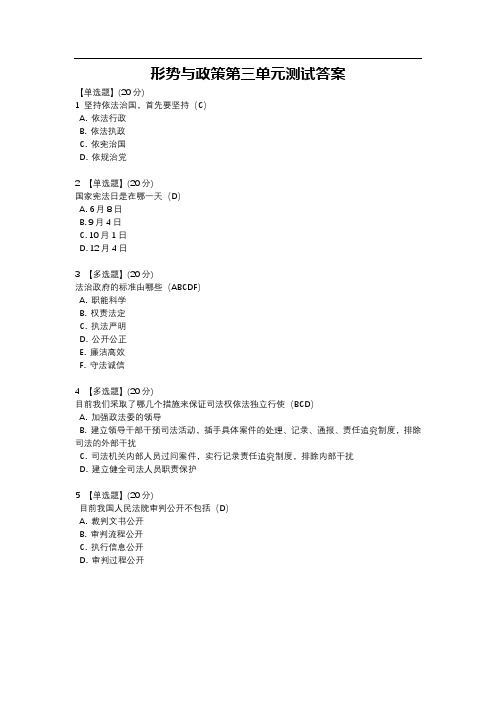
【单选题】(20分)
1 坚持依法治国,首先要坚持(C)
A. 依法行政
B. 依法执政
C. 依宪治国
D. 依规治党
2 【单选题】(20分)
国家宪法日是在哪一天(D)
A. 6月8日
B. 9月4日
C. 10月1日
D. 12月4日
3 【多选题】(20分)
法治政府的标准由哪些(ABCDF)
D. 建立健全司法人员职责保护
5 【单选题】(20分)
目前我国人民法院审判公开不包括(D)
A.D. 审判过程公开
A. 职能科学
B. 权责法定
C. 执法严明
D. 公开公正
E. 廉洁高效
F. 守法诚信
4 【多选题】(20分)
目前我们采取了哪几个措施来保证司法权依法独立行使(BCD)
A. 加强政法委的领导
B. 建立领导干部干预司法活动,插手具体案件的处理、记录、通报、责任追究制度,排除司法的外部干扰
C. 司法机关内部人员过问案件,实行记录责任追究制度,排除内部干扰
职业道德与法律第三单元 测试答案
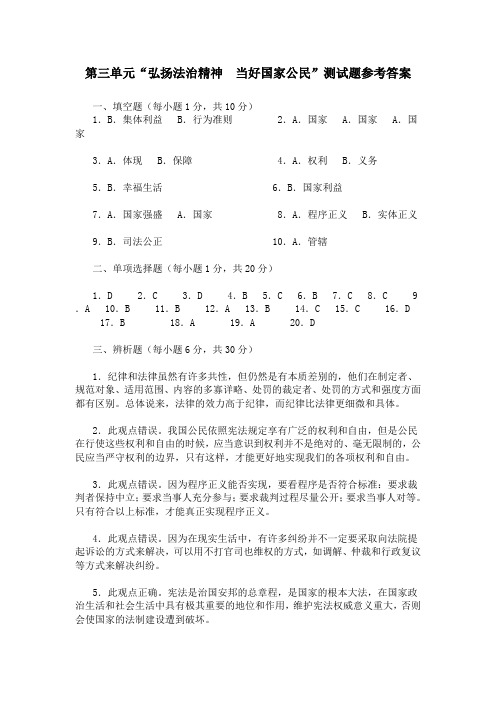
第三单元“弘扬法治精神当好国家公民”测试题参考答案一、填空题(每小题1分,共10分)1.B.集体利益 B.行为准则2.A.国家 A.国家 A.国家3.A.体现 B.保障4.A.权利 B.义务5.B.幸福生活 6.B.国家利益7.A.国家强盛 A.国家8.A.程序正义 B.实体正义9.B.司法公正10.A.管辖二、单项选择题(每小题1分,共20分)1.D 2.C 3.D 4.B 5.C 6.B 7.C 8.C 9.A 10.B 11.B 12.A 13.B 14.C 15.C 16.D 17.B 18.A 19.A 20.D三、辨析题(每小题6分,共30分)1.纪律和法律虽然有许多共性,但仍然是有本质差别的,他们在制定者、规范对象、适用范围、内容的多寡详略、处罚的裁定者、处罚的方式和强度方面都有区别。
总体说来,法律的效力高于纪律,而纪律比法律更细微和具体。
2.此观点错误。
我国公民依照宪法规定享有广泛的权利和自由,但是公民在行使这些权利和自由的时候,应当意识到权利并不是绝对的、毫无限制的,公民应当严守权利的边界,只有这样,才能更好地实现我们的各项权利和自由。
3.此观点错误。
因为程序正义能否实现,要看程序是否符合标准:要求裁判者保持中立;要求当事人充分参与;要求裁判过程尽量公开;要求当事人对等。
只有符合以上标准,才能真正实现程序正义。
4.此观点错误。
因为在现实生活中,有许多纠纷并不一定要采取向法院提起诉讼的方式来解决,可以用不打官司也维权的方式,如调解、仲裁和行政复议等方式来解决纠纷。
5.此观点正确。
宪法是治国安邦的总章程,是国家的根本大法,在国家政治生活和社会生活中具有极其重要的地位和作用,维护宪法权威意义重大,否则会使国家的法制建设遭到破坏。
数据结构第三单元测验答案
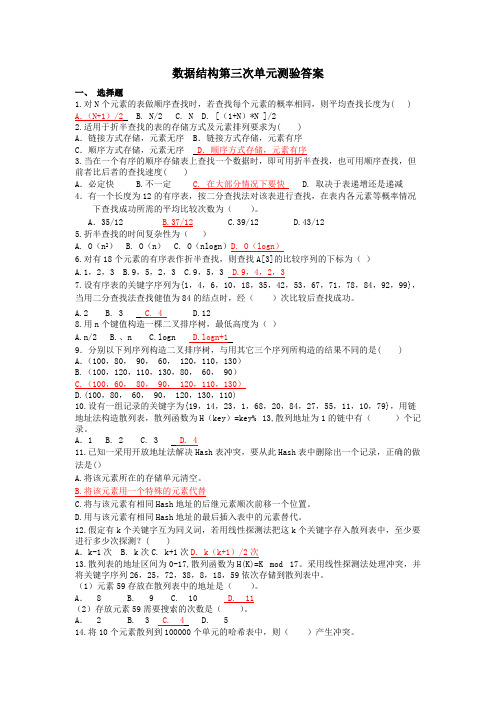
数据结构第三次单元测验答案一、选择题1.对N个元素的表做顺序查找时,若查找每个元素的概率相同,则平均查找长度为( ) A.(N+1)/2 B. N/2 C. N D. [(1+N)*N ]/22.适用于折半查找的表的存储方式及元素排列要求为( )A.链接方式存储,元素无序 B.链接方式存储,元素有序C.顺序方式存储,元素无序D.顺序方式存储,元素有序3.当在一个有序的顺序存储表上查找一个数据时,即可用折半查找,也可用顺序查找,但前者比后者的查找速度( )A.必定快 B.不一定 C. 在大部分情况下要快 D. 取决于表递增还是递减4.有一个长度为12的有序表,按二分查找法对该表进行查找,在表内各元素等概率情况下查找成功所需的平均比较次数为()。
A.35/12 B.37/12 C.39/12 D.43/125.折半查找的时间复杂性为()A. O(n2)B. O(n)C. O(nlogn)D. O(logn)6.对有18个元素的有序表作折半查找,则查找A[3]的比较序列的下标为()A.1,2,3B.9,5,2,3C.9,5,3D.9,4,2,37.设有序表的关键字序列为{1,4,6,10,18,35,42,53,67,71,78,84,92,99},当用二分查找法查找健值为84的结点时,经()次比较后查找成功。
A.2B. 3C. 4D.128.用n个键值构造一棵二叉排序树,最低高度为()A.n/2B.、nC.lognD.logn+19.分别以下列序列构造二叉排序树,与用其它三个序列所构造的结果不同的是( ) A.(100,80, 90, 60, 120,110,130)B.(100,120,110,130,80, 60, 90)C.(100,60, 80, 90, 120,110,130)D.(100,80, 60, 90, 120,130,110)10.设有一组记录的关键字为{19,14,23,1,68,20,84,27,55,11,10,79},用链地址法构造散列表,散列函数为H(key)=key% 13,散列地址为1的链中有()个记录。
四年级第三单元测试卷答案【含答案】
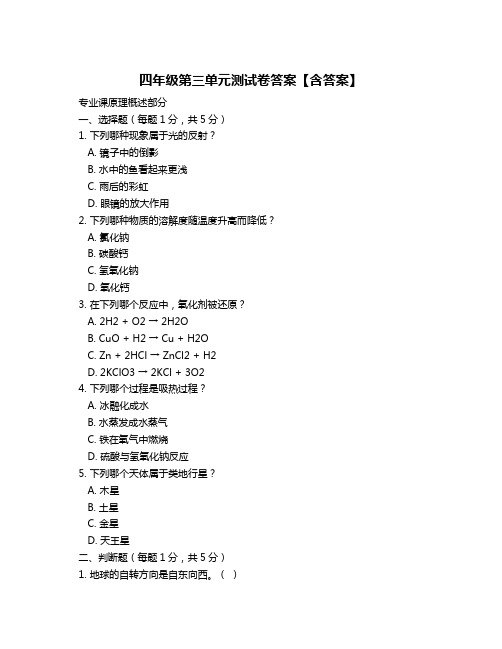
四年级第三单元测试卷答案【含答案】专业课原理概述部分一、选择题(每题1分,共5分)1. 下列哪种现象属于光的反射?A. 镜子中的倒影B. 水中的鱼看起来更浅C. 雨后的彩虹D. 眼镜的放大作用2. 下列哪种物质的溶解度随温度升高而降低?A. 氯化钠B. 碳酸钙C. 氢氧化钠D. 氧化钙3. 在下列哪个反应中,氧化剂被还原?A. 2H2 + O2 → 2H2OB. CuO + H2 → Cu + H2OC. Zn + 2HCl → ZnCl2 + H2D. 2KClO3 → 2KCl + 3O24. 下列哪个过程是吸热过程?A. 冰融化成水B. 水蒸发成水蒸气C. 铁在氧气中燃烧D. 硫酸与氢氧化钠反应5. 下列哪个天体属于类地行星?A. 木星B. 土星C. 金星D. 天王星二、判断题(每题1分,共5分)1. 地球的自转方向是自东向西。
()2. 酸雨的主要成分是硫酸和硝酸。
()3. 蒸发是一种物理变化。
()4. 碳酸钙在水中溶解度很小。
()5. 光年是距离单位。
()三、填空题(每题1分,共5分)1. 地球围绕太阳公转的周期是一年,公转的方向是______。
2. 在化学反应中,能提供电子的物质称为______。
3. 水的凝固点是______摄氏度。
4. 光在真空中的传播速度是______。
5. 人体最大的消化腺是______。
四、简答题(每题2分,共10分)1. 简述地球自转产生的地理现象。
2. 解释酸雨的形成原因及其对环境的影响。
3. 描述水的三态变化及其对应的能量变化。
4. 解释氧化还原反应的基本概念。
5. 简述太阳系中行星的分类。
五、应用题(每题2分,共10分)1. 如果一个物体的质量为2kg,在地球表面的重力是多少?2. 氢氧化钠溶液的pH值为12,求该溶液中的氢离子浓度。
3. 如果一个反应的活化能为50kJ/mol,反应速率常数k1和k2分别在温度T1和T2下测得,若T2比T1高10℃,求k2与k1的比值。
化学第三单元试题及答案

化学第三单元试题及答案一、选择题(每题2分,共10分)1. 下列物质中,属于纯净物的是()A. 空气B. 蒸馏水C. 矿泉水D. 石油2. 化学反应中,化学键断裂吸收能量,化学键形成放出能量,以下说法正确的是()A. 化学反应一定放出能量B. 化学反应一定吸收能量C. 化学反应可能放出能量,也可能吸收能量D. 化学反应的能量变化只与化学键的断裂有关3. 以下物质中,属于氧化物的是()A. 二氧化碳B. 氢气C. 氯化钠D. 氧气4. 根据质量守恒定律,化学反应前后元素的种类不变,以下说法正确的是()A. 反应物中没有碳元素,生成物中可以有碳元素B. 反应物中没有碳元素,生成物中不可能有碳元素C. 反应物中没有碳元素,生成物中可能有碳元素D. 反应物中没有碳元素,生成物中一定有碳元素5. 根据金属活动性顺序,以下说法正确的是()A. 铁比铜活泼B. 铜比铁活泼C. 铁比铜不活泼D. 铜比铁不活泼二、填空题(每题2分,共10分)1. 化学方程式表示的意义包括反应物和生成物的种类、反应物和生成物的_________、反应条件以及_________。
2. 根据酸碱中和反应的原理,当酸和碱的量相等时,反应生成的是_________。
3. 金属活动性顺序中,排在氢前面的金属能与酸反应生成_________和氢气。
4. 燃烧是一种剧烈的氧化反应,其特点是反应物与氧气发生反应,放出大量的_________和光。
5. 根据质量守恒定律,化学反应前后元素的种类不变,原子的种类和个数也_________。
三、简答题(每题5分,共10分)1. 请解释为什么说化学反应是物质的转化过程?答:化学反应是物质的转化过程,因为在这个过程中,旧的化学键被断裂,新的化学键形成,从而生成了新的物质。
这一过程伴随着能量的变化,如热量的释放或吸收。
2. 为什么说质量守恒定律是化学反应中的基本定律?答:质量守恒定律是化学反应中的基本定律,因为它表明在化学反应中,尽管物质的形态和性质可能发生变化,但反应前后物质的总质量保持不变。
新标准大学英语3第三单元课后答案
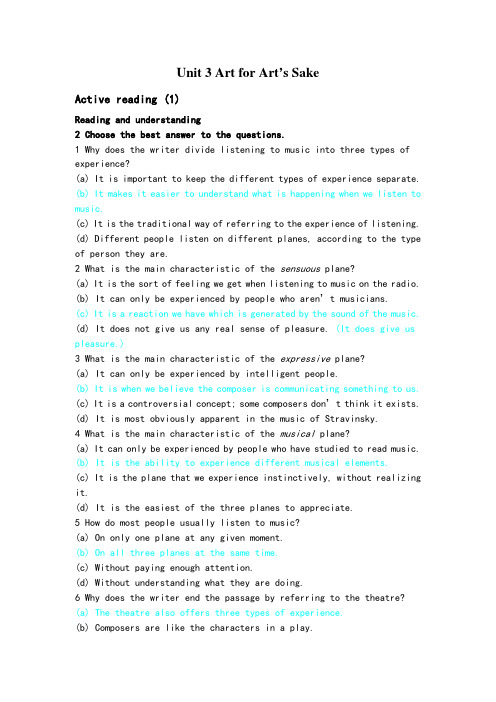
Unit 3 Art for Art’s SakeActive reading (1)Reading and understanding2 Choose the best answer to the questions.1 Why does the writer divide listening to music into three types of experience?(a) It is important to keep the different types of experience separate.(b) It makes it easier to understand what is happening when we listen to music.(c) It is the traditional way of referring to the experience of listening.(d) Different people listen on different planes, according to the type of person they are.2 What is the main characteristic of the sensuous plane?(a) It is the sort of feeling we get when listening to music on the radio.(b) It can only be experienced by people who aren’t musicians.(c) It is a reaction we have which is generated by the sound of the music.(d) It does not give us any real sense of pleasure. (It does give us pleasure.)3 What is the main characteristic of the expressive plane?(a) It can only be experienced by intelligent people.(b) It is when we believe the composer is communicating something to us.(c) It is a controversial concept; some composers don’t think it exists.(d) It is most obviously apparent in the music of Stravinsky.4 What is the main characteristic of the musical plane?(a) It can only be experienced by people who have studied to read music.(b) It is the ability to experience different musical elements.(c) It is the plane that we experience instinctively, without realizing it.(d) It is the easiest of the three planes to appreciate.5 How do most people usually listen to music?(a) On only one plane at any given moment.(b) On all three planes at the same time.(c) Without paying enough attention.(d) Without understanding what they are doing.6 Why does the writer end the passage by referring to the theatre?(a) The theatre also offers three types of experience.(b) Composers are like the characters in a play.(c) Theatre is the form of art which is most similar to music.(d) The audience in a theatre are like musicians in an orchestra.3 Match the liste ners’ activities with the planes they are on.1 They understand the way the composer is thinking.(c) musical plane2 They are doing something else at the same time.(a) sensuous plane3 They recognize different elements in the music.(c) musical plane4 They just want to escape from everyday reality.(a) sensuous plane5 They feel sad or happy because of the music.(b) expressive plane6 They think the music they are listening to has a meaning.(b) expressive planeDealing with unfamiliar words4 Match the words in the box with their definitions.1 to make up or form something (constitute)2 happening or done at the same time (simultaneously)3 able to do something because you have the knowledge, skill, or experience that is needed (qualified)4 a regular pattern of sounds in music that you can show by moving, hitting your hands together, or hitting a drum or other surface (rhythm)5 to receive or obtain something from something else (derive)6 someone who writes music, especially classical music (composer)7 as much as is needed (sufficiently)5 Complete the paragraph with the correct form of the words in Activity 4.Johann Sebastian Bach is possibly the greatest (1) composer the world has ever known. His Well- Tempered Clavichord (2) constitutes one of the most complete works for keyboard ever written. It is (3) simultaneously both a series of technical exercises which explore the possibilities of the keyboard, and a masterpiece of expressive feeling. Although he was a highly (4) qualified musician (as an organist and a choirmaster), he was not considered to be (5) sufficiently “modern” by the generationwhich followed him, and he was soon forgotten. But his music was rediscovered in the 19th century, for its perfect sense of (6) rhythm and harmony. Indeed, many of the great composers of the 20th century, such as Stravinsky, (7) derived a lot of their musical ideas from him.6 Replace the underlined words with the correct form of the words and expressions in the box. You may need to make other changes.1 Sh h! They’re about to announce the winner of this year’s International Piano Competition. (proclaim)2 It’s quite easy to make a comparison between poetry and music. (analogy) It’s quite easy to make an analogy between poetry and music.3 We are amazed by her ability to express herself with great clearness and simplicity. (clarity)4 How many artists have given up everything for the cause of their art? (for the sake of)5 Internet emerges as a powerful and effective force in advertising new products. (potent)6 I enjoyed the performance, but I thought the clothes the actors were wearing were a bit silly. (costumes)7 Answer the questions about the words and expressions.1 If you split something up, do you (a) divide it into parts, or (b) put the parts together?2 If you do something absent-mindedly, are you (a) thinking about what you are doing, or (b) thinking about something else?3 Do you look for consolation (a) after a piece of bad news, or (b) aftera piece of good news?4 If you are treading on controversial ground, are you (a) taking a risk, or (b) making everybody happy?5 If you shy away from something, do you (a) keep close to it, or (b) keep your distance from it?6 If you pin something down, are you (a) able to examine it carefully, or (b) unable to examine it carefully?7 If you know the melody of a piece of music, are you familiar with (a) the tune, or (b) the meaning of the music?8 Is an instinctive reaction to something (a) automatic, or (b) one which follows a lot of thought?Reading and interpreting8 Work in pairs and choose the best answer to the questions.1 Which is the writer’s main purpose?(a) To show how complex listening to music is.(b) To get people to listen to music more.(c) To discourage some people from listening to music.(d) To get people to think about how they listen to music.2 Who does the writer address as you?(a) Musicians.(b) Theatregoers.(c) Composers.(d) Intelligent music lovers.Active reading (2)Reading and understanding3 Answer the questions.1 What type of painting is Girl with a Pearl Earring?It’s a world-famous portrait painted by Vermeer around 1665.2 Who was the model for the painting?Griet, a young girl who is thought to work in Vermeer’s house.3 How much of the novel is based on fact?The setting and some of the main ideas are factual but the details of the story are speculation and fiction.4 What was the relationship between Griet and Vermeer?Griet was a maid in Vermeer’s household and she became his model. Vermeer thought she had some artistic talent.5 Why did Griet leave the Vermeer household?Vermeer’s daughter and wife found out that Griet was modeling for Vermeer. Griet got embarrassed when the wife stormed into the studio, so she left.6 What differences are there between the book and the film?According to the film, the earrings are finally delivered to Griet and the audience is left wondering if she marries Pieter. The novel does not talk about it.4 Match the events with their sources.1 Griet gets a job with the Vermeer family.(b) in the novel by Tracy Chevalier2 Vermeer makes a hole in Griet’s ear.(c) in the film version of the novel3 Vermeer marries a Catholic girl called Catharina.(a) known fact4 Catharina is jealous of Griet.(b) in the novel by Tracy Chevalier5 Vermeer becomes a Catholic.(a) known fact6 Van Ruijven wants to be painted with Griet.(b) in the novel by Tracy Chevalier7 Vermeer grows up in Delft.(a) known fact8 Somebody sends the earrings to Griet after Vermeer’s death.(c) in the film version of the novel9 Griet becomes Vermeer’s assistant.(b) in the novel by Tracy Chevalier10 Griet is embarrassed when Vermeer sees her hair.(b) in the novel by Tracy ChevalierDealing with unfamiliar words5 Match the words in the box with their definitions.1 someone who looks at a picture, photograph, or piece of art (viewer)2 a painting, drawing or photograph of someone, especially of their face only (portrait)3 relating to people’s homes and family life (domestic)4 the inside part of something, especially a building or vehicle (interior)5 as a result (consequently)6 to start to employ someone or use their services (engage)7 to officially ask for a piece of work to be done for you (commission)6 Complete the paragraph with the correct form of the words in Activity 5.In the beginning it was only the rich and famous who had their (1) portraits painted. But from the Renaissance onwards things changed. Firstly, the growing importance of the middle classes led many ordinary people to (2) commission paintings, often of members of their family. Secondly, artists became interested in showing scenes of (3) domestic life, set in the (4) interiors of ordinary houses, and (5) consequently theybegan to (6) engage ordinary people, such as servant girls, as models. Part of the mystery for (7) viewers today concerns the identity of these models, in masterpieces such as Leonardo’s Mona Lisa and Vermeer’s Girl with a Pearl Earring.7 Replace the underlined words with the correct form of the words and expressions in the box.1 He changed his religion from Protestantism and became a Catholic. (converted)2 One of the assistant’s jobs was to break into a powder the paints. (grind)3 The newspaper started to change the fact so that it was no longer true ever since it existed, and the local government was definitely one of the victims. (distort)4 You don’t have to make a hole in your ears to be able to wear these earrings. (pierce)5 The lives of artists have often been linked to shocking events and situations. (scandals)6 One of the most striking aspects of the painting is the turban she is wearing on her head. (features)7 I’ll finish the painting this evening, so from now until then you can have a break. (in the meantime)8 Answer the questions about the words and expressions.1 Are exotic clothes likely to be (a) ordinary, or (b) unusual?2 Is a sitter someone who (a) is being painted, or (b) spends a lot of time sitting down?3 Is a conventional sense of beauty one which is (a) shared and understood by most people, or (b) different from what is shared and understood by most people?4 Is an enigmatic expression one which is full of (a) good humour, or (b) mystery?5 If you have a volatile personality, do you get angry (a) quickly, or(b) only when you can’t tolerate?6 If you are wary of something, are you (a) excited about it, or (b) careful and nervous about it?7 If you show something explicitly, do you (a) make its meaning very clear so there is no doubt about it, or (b) leave its meaning unclear?8 If a woman tries to keep her modesty, does she (a) cover her hair and body to avoid any sexual feeling in men, or (b) talk and act with good grace?9 Is jealousy the feeling you get when you think someone you love (a) is attracted to somebody else, or (b) doesn’t love you any more?Language in useword formation: compound nouns1 Form compound nouns to indicate:1 a writer of songs (songwriter)2 a director of films (film director)3 a scarf you wear around your head (headscarf)4 a pack you carry on your back (backpack)5 a stick you use to make your lips red (lipstick)6 a lace you use to tie up your shoe (shoelace)7 polish that you put on your nails (nail polish)might have been / done2 Rewrite the sentences using might have been / done .1 It’s possible that the artist and the mo del became lovers.The artist and the model might have been lovers.2 It’s possible that Catharina was never jealous of the model. Catharina might never have been jealous of the model.3 It’s possible that the model became Vermeer’s assistant.The model mi ght have become Vermeer’s assistant.4 It’s possible that Vermeer painted other masterpieces which have since been lost.Vermeer might have painted other masterpieces which have since been lost.5 It’s possible that Vermeer died in poverty.Vermeer might have died in poverty.may be due to the fact that …3 Complete the sentences with your own ideas using may be due to the fact that …1 The young pianist’s musical genius may be due to the fact that his mother played the piano a lot while she was pregnant, so he has always heard music from day one.2 The late arrival of the train may be due to the fact that there weresevere storms last night.3 The misunderstanding may be due to the fact that she speaks very little Chinese and I don’t speak much Spanish.4 The book’s enormous popularity may be due to the fact that it has been aggressively marketed on TV and it was discussed in several prime time TV shows.5 His dislike of music may be due to the fact that he was exposed to loud rock music for many hours a day when he was quite small.insist that …4 Rewrite the sentences using insist that …1 I met an old friend who refused to let me go before I had a drink with him.I met an old friend, who insisted that I have a drink with him before he let me go.2 The customs people refused to let me through unless I signed a document they gave me.The customs people insisted that I sign a document they gave me before they let me through.3 We refused to let him start the concert before having an hour’s rest. We insisted that he have an hour’s rest before he started the concert.4 They refused to publish the book until he changed some of the things he had written.They insisted that he change some of the things he’d written before they published the book.5 She refused to let me see the painting until I apologized for what I had done.She insisted that I apologize for what I had done before she let me see the painting.6 Translate the paragraphs into Chinese.1 Listen, if you can, to the 48 fugue themes of Bach’s Well-Tempered Clavichord. Listen to each theme, one after another. You will soon realize that each theme mirrors a different world of feeling. You will also soon realize that the more beautiful a theme seems to you the harder it is to find any word that will describe it to your complete satisfaction. Yes, you will certainly know whether it is a gay theme or a sad one. You will be able, in other words, in your own mind, to draw a frame of emotionalfeeling around your theme. Now study the sad one a little closer. Try to pin down the exact quality of its sadness. Is it pessimistically sad or resignedly sad; is it fatefully sad or smilingly sad?可能的话,你不妨听听巴赫的《平均律钢琴曲集》中的48个赋格主题。
基础学习知识英语第三单元规范标准答案
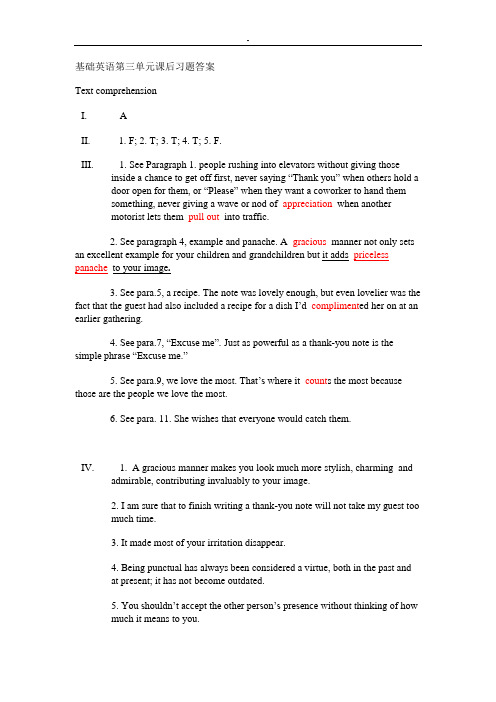
基础英语第三单元课后习题答案Text comprehensionI.AII. 1. F; 2. T; 3. T; 4. T; 5. F.III. 1. See Paragraph 1. people rushing into elevators without giving those inside a chance to get off first, never saying “Thank you” when others hold adoor open for them, or “Please” when they want a coworker to hand themsomething, never giving a wave or nod of appreciation when anothermotorist lets them pull out into traffic.2. See paragraph 4, example and panache. A gracious manner not only sets an excellent example for your children and grandchildren but it adds priceless panache to your image.3. See para.5, a recipe. The note was lovely enough, but even lovelier was the fact that the guest had also included a recipe for a dish I’d compliment ed her on at an earlier gathering.4. See para.7, “Excuse me”. Just as powerful as a thank-you note is the simple phrase “Excuse me.”5. See para.9, we love the most. That’s where it count s the most because those are the people we love the most.6. See para. 11. She wishes that everyone would catch them.IV. 1.A gracious manner makes you look much more stylish, charming and admirable, contributing invaluably to your image.2. I am sure that to finish writing a thank-you note will not take my guest toomuch time.3. It made most of your irritation disappear.4. Being punctual has always been considered a virtue, both in the past andat present; it has not become outdated.5. You shouldn’t accept the other person’s presence witho ut thinking of howmuch it means to you.6. Good manners are easy to catch.Structural analysis of the textI. Vocabulary AnalysisI. Phrase practice1. get away from sth. = become different from what it should be like偏离了以往的规范2. giving a wave or nod of appreciation = displaying gratitude by waving a hand or nodding the head招手或点头以表示感谢pull out into traffic =move out onto the main road从路侧驶入车流3. matter very much = be of great significance4.on the receiving end =who receives the thank-you remark接收方;5. go a long way = produce a far-reaching effect有长远的影响II.1.punctuality;2. routine;3. infectious;4. bet;5. terrific;6. board;7. valued;8.count; 9. cherishes; 10. irritations.III.1.matter:to be important, or to affect what happenshappen:when something happens, there is an event, especially one that is not plannedcare:if you care about something, you feel that it is important and are concerned about itmind:to take care of someone or something2.hurry:to do something or go somewhere more quickly than usual, especially because there is not much timerush:if you rush somewhere, you go there quicklyhasten:you hasten something by acting in order to make it happen sooner quicken:to become quicker or make something quicker3.copartner:a joint partner (as in a business enterprise)coworker:your coworker is someone you work with, especially people on the same job or project as youcolleague:your colleagues are the people you work with, especially in a professional jobcooperative:a business or organization owned equally by all the people working there4.pull up:the driver stops the car, often for a short timepull out:a vehicle starts moving onto a road or onto a different part of the roadpull off:to drive a car off a road in order to stop, or to turn into a smaller roadpull down:to earn a particular amount of moneye.g.He is pulling down $5,000 a year.5.manner:the way in which people behave and talk when they are with other people, for example whether they are polite, confident or bad-temperedbehaviour:the thing that a person or animal doesact:something that you doway:the ways of a particular person or group of people are their customs or their usual behavior6.graceful:behave in a pleasant waygracious:behaving in a polite, kind, and generous way, especially to people of a lower rankgrateful:wish to thankgrand:splendid in style and appearance; attracting admiration and attention7.menu:a list of all the kinds of food that are available for a meal, especially in a restaurantcookbook:a book that contains recipes for preparing foodrecipe:a set of instructions for cooking a particular type of foodingredient:a food that is used with other foods in the preparation of a particular dish 8.huge:extremely large in size, amount, or degreeenormous:emphasizing the great degree or extent of somethingvast:extremely bigcolossal:used to emphasize that something is extremely largeIV.pliment: praise insincerely as an empty formality or self-interestedgesture.a. praised;b. compliment;c. praise;d. complimented.2.appreciate: be thankful or grateful; like or value something.a. appreciated;b. enjoyed;c. enjoying;d. appreciated.3.precious: valuable, rare, important. Priceless: worth a lot of money.a. priceless;b. priceless;c. precious;d. precious.4.notice: take in a small detail.a. see;b. notice;c. see;d. noticdV. Synonym / AntonymGive synonyms or antonyms of the word underlined in each sentence in the sense it is used.1. … never giving a wave or nod of appreciation when another motorist lets them pull out into traffic.Synonyms: thanks, recognition2. In our laziness we think that something like a simple “Thank you” doesn’t really matter.Antonyms: activeness, liveliness, briskness, eagerness3. We can’t be truly stylish without good manners.Synonyms: fashionable, graceful, elegant4. Haven’t you noticed that the kindest, most generous people seem to keep getting prettier?Antonyms: selfish, mean, ungenerous5. A gracious manner not only sets an excellent example for your children and grandchildren but it adds panache to your image.Synonyms: nice, courteous, polite, friendly6. I know we all have busy lives.Antonyms: leisurely, relaxed, idle, unoccupied, lazy7. But when someone does stop and turn around and genuinely apologizes, doesn’t itmelt awaymost — if not all — of the irritation you felt?Synonyms: annoyance, vexation, displeasure, dissatisfaction8.And punctuality is not a thing of the past, either.Antonyms: promptness, timekeeping, reliability4. Word derivationFill in the blank in each sentence with an appropriate form of the given capitalized word in the brackets.1..The next-door neighbours are so unfriendly that we have stopped trying to talk to them. (friend)2.Yes, I can speak a little Spanish because I spent some of my boyhood in Spain. (boy)3.The doctor dealt with the hysterical patient with understanding. (understand)4.Th ere’s a reception at the British Embassy tonight. (receive)5.The disappearance of the money from the cash-box shows that somebody in this office is a thief. (appear)6.You must accept the decision of the committee. (decide)7.Tom and Tim are twin brothers. They look exactly alike,(动名词短语独立结构)differing only in height. (difference)8.To relieve the traffic congestion, the government has built several elevated road s in the city. (elevator).1. friend (n.)朋友,友人,支持者friendly (adj.&adv.)友好的,友善的friendship (n.)友谊,友好friendliness (n.)友好,亲切friendless (adj.)没有朋友的,无依无靠的unfriendly (adj.)不友好的,有敌意的2. boy (n.)男孩,儿子,男服务员boyish (adj.)像男孩子的boyhood (n.)少年时代boylish (adj.)男孩样的,很帅气的boyishness (n.)少年,幼稚,孩子气3. understand (v.)理解,懂,听说,获悉understanding (n.)了解,理解,个人见解,非正式协议understandingly (adv.)谅解地understandable (adj.)可理解的,能够懂的understandability (n.)易懂性,可理解性understandableness (n.)不可理解misunderstand (v.)误会,误解misunderstanding (n.)误会,误解4. receive(v.)收到,接到,受到received (adj.)被一般承认的,公认的receiving (n.)接收,买卖赃物receiver (n.)接收器,收款员,接待者,听筒receivable (adj.)可收到的,应收的receivability (n.)可以接受,可接纳5. appear(v.)出现,显得,出版,抵达appearance (n.)外表,外貌出场,露面,出现disappear (v.)消失,不见disappearance (n.)消失6. decide(v.)决定,判断decided (adj.)确定的,坚决的decision (n.)决定,决策decisiveness (n.)坚决,果断decisive (adj.)决定性的7. difference (n.)差异,分歧,差额,不同different (adj.)不同的,差异的differ (v.)不同,相异,有区别differential (adj.)差别的,特定的,微分的differentiate (v.)识别,使差异,求导数,区分differentiation (n.)区别,分化,变异8. elevator (n.)电梯,飞机升降陀elevate (v.)举起,提拔,素养提升,鼓舞elevation (n.)海拔,提拔,提高elevatory (adj.)向上举的,升高的II Grammar Exercise1. "more … than" construction※You can use “a little”, “ a lot”, “a bit”, “a great deal”, “any”, “far”, “ even” “still”, and “much” in front of more than construction.2. "as … ss" constructionas +adjective / adverb + as.※You can use “just”, “almost”, “nearly” , “quite” in front of "as… as" construction,3.the mostthree or more than three people or things are compared.The negative form of the superlative construction is "the least".I.II. 1. older than;2.more interested;3.as crowded as;4.as pale as;5.more exciting than;6.as complicated as;7.easier than;8.as expensive as;9.more selective;10.nicer;11.as unlucky as;12.more difficult.III.1.stronger;2.more noisy;3.more expensive;4.more difficult;5.happier;6.younger;7.more often;8.further;9.more exciting;10.louder.IV. Use superlatives or comparatives of the adjectives given to complete the sentences.1. I prefer this chair to the other one. It’s _more_comfortable_ (comfortable).2. That’s __the_funniest__ (funny) joke I have ever heard.3. Now I’ve realiz ed that giving up my job is __the__worst__ (bad) mistake I have ever made.4. more serious;5. the most popular;6. quieter;7. the most beautiful;8. healthier;9. the least honorable;10. less challenging, least challenging.V.1. elder: older;2. eldest: oldest;3. older and elder are both right;4. further and farther are both right;5. farther: further;6. more an: a more;7. better;8. right.III. Translation exercisesI. Translation from English into Chinese.1.譬如,我在纽约就看到这样的差别,与我20多年前刚搬来时大不相同了:人们蜂拥走进电梯,却没有让电梯里面的人先出来;别人为他们开门时,从来不说“谢谢”;需要同事给他们递东西时,从来不说“请”;当其他开车人为他们让道时,也从不挥手或点头表示谢意。
第三单元测试卷答案六年级【含答案】

第三单元测试卷答案六年级【含答案】专业课原理概述部分一、选择题(每题1分,共5分)1. 下列哪种现象属于光的折射?A. 镜子中的倒影B. 放大镜放大文字C. 彩虹的形成D. 太阳光直线传播2. 下列哪种物质是导体?A. 玻璃B. 纸张C. 人体D. 塑料3. 关于能量守恒定律,下列哪种说法是正确的?A. 能量可以从无中产生B. 能量可以从一种形式转化为另一种形式,但总能量不变C. 能量可以消失D. 能量只能以一种形式存在4. 下列哪种植物是通过种子繁殖后代的?A. 苔藓B. 蕨类C. 草本植物D. 藻类5. 下列哪种动物属于哺乳动物?A. 鸟类B. 鱼类C. 昆虫D. 哺乳动物二、判断题(每题1分,共5分)1. 地球是太阳系中的第八颗行星。
()2. 食物链中,生产者总是位于第一级。
()3. 动物细胞和植物细胞都有细胞壁。
()4. 水的沸点随着海拔的升高而升高。
()5. 发电机是根据电磁感应原理工作的。
()三、填空题(每题1分,共5分)1. 光在真空中的速度是______m/s。
2. 人体需要的主要营养素有______、______、______、______、______和______。
3. 地球上最大的生物圈是______。
4. 声音是由物体的______产生的。
5. 电阻的单位是______。
四、简答题(每题2分,共10分)1. 简述牛顿的三大运动定律。
2. 简述光合作用的过程。
3. 简述地球的水循环过程。
4. 简述遗传和变异的概念。
5. 简述人体免疫系统的功能。
五、应用题(每题2分,共10分)1. 一个物体的质量为5kg,受到一个10N的力作用,求该物体的加速度。
2. 一束光从空气斜射入水中,入射角为45度,求折射角。
3. 一个电路由一个电阻R和一个电源E组成,已知电阻R=10Ω,电源E=12V,求电路中的电流I。
4. 一个正方体的边长为2cm,求其体积。
5. 一个化学反应的化学方程式为2H2 + O2 → 2H2O,求反应物和物的摩尔比。
- 1、下载文档前请自行甄别文档内容的完整性,平台不提供额外的编辑、内容补充、找答案等附加服务。
- 2、"仅部分预览"的文档,不可在线预览部分如存在完整性等问题,可反馈申请退款(可完整预览的文档不适用该条件!)。
- 3、如文档侵犯您的权益,请联系客服反馈,我们会尽快为您处理(人工客服工作时间:9:00-18:30)。
8. I am wearing twice as much as I usually do (是平时穿的两倍) because of the cold weather. (Para.4, L.14)
8. 延缓变化的速度 slow down the rate of change (Para.2, L.12)
9. 确保方向正确的变化 ensure the changes in the right direction (Para.3, L.2)
10. 在一个民主社会 in a democratic society (Para.3, L.3)
2. 大多数民众 the vast minority of population (Para.1, L.8)
3. 将时钟拨回到从前 put the clock back to an earlier age (Para.2, L.1)
4. 阻止未来的进一步发展 prevent further advances in the future (Para.2, L.3)
1. the line of products will be highly profitable 这个行业的产品将十分有利可图 (P.67-I-3-3)
2. regain health 恢复健康 (P.68-II-1)
3. the right attitude towards science 对科学的正确态度 (P69-Cloze 1- L.1)
4. the proportion of the population 人口比例 (P.69-Cloze 1-L.9)
5. make discoveries that have practical value 做出具有实际应用价值的发现
(P.69-Cloze 2- L.5)
6. a glass wire 光纤 (P.70-Cloze 2-L.7)
5. 带来技术的发展 bring about advances in technology (Para.2, L.6)
6. 压制新生事物 suppress anything new (Para.2, L.10)
7. 人的积极极性和创造力 human initiative and inventiveness (Para.2, L.10)
7. endless number of new discoveries 无穷无尽的新发现 (P.70-Cloze 2- L.10)
8. in a space station in orbit around the earth 在一个围绕地球轨道运行的空间站
(P.70-Cloze 2- L.17)
21. 用文字和图表表述 convey sth. by words and diagrams (Para.5, L.4)
22. 提供基本框架 provide the basic framework (Para.6, L.1)
23. 阐明新的发展 put across new developments (Para.6, L.8)
30. 充分相信 have sufficient faith in sth. (Para.7, L.4)
巩固应用
I. Directions: Now you’ve learned Text A in detail. Let’s check how much you’ve learned from it! Please translate the Chinese expressions in the following sentences into English. Be sure you use expressions from the text.
Key to Unit 3
Text A Public Attitudes Toward Science
课前预习
Directions: Read the text and find out the English versions for the following expressions.
1. 享有特权的少数人 a privileged minority (Para.1, L.6)
9. Later, I’ll prove what you say wrong (证明你所说的是错的). (Para.7, L.5)
II. Language Focus
Ex. 1. Translate the following English expressions into Chinese and Chinese into English.
24. 小部分人 a small proportion of the population (Para.6, L.10)
25. 科学奇迹 scientific wonders (Para.6, L.12)
26. 负有教育民众的重任 have a responsibility to educate the public (Para.6, L.16)
1. As pace of life quickens (随着生活的节奏加快), things tend to change fast in the city. (P.66-I-1-4)
2. The decision on the new project is made on the basis of scientific study (在科学研究的基础之上). (P.67-I-3-2)
1. Whether you believe it or not (信不信由你),we were left waiting in the rain for two hours.
(Para.1, L.1)
2. We saw /viewed this event as a turning point (把这件事看作是一个转折点). (Para.1, L.4)
14. 科幻小说 science fiction (Para.3, L.17)
15. 利用这种兴趣 harness this interest (Para.4, L.1)
16. 以一种枯燥乏味的方式 in a dry and uninteresting manner (Para.4, L.6)
3. I can’t afford a car, so I guess I will have to do without (就只好不用了) . (Para.1, L.7)
4. Forget all about it and look to the future; you can’t put the clock back (让时光倒流). (Para.2, L.1)
9. 扔掉这些旧椅子 get rid of these old chairs (P.66-I-1-5)
10. 及时的帮助 timely help (P.66-I-1-9)
11. 做出精确的预言 make accurate predictions (P.67- I-3-3)
3. We have succeeded because we had the foresight to invest in new technology (投资于新技术的先见之明). (P.68-II-6)
4. Only a minority of people support military action. The majority are for a peaceful solution (赞成和平解决). (P.69-III-2-1)
17. 认识其与世界的联系 see its relevance to the world (Para.4, L.7)
18. 通俗读物 popular books (Para.4, L.11)
19. 倾向于做某事 tend to do sth. (Para.5, L.1)
20. 科学概念 scientific concepts (Para.5, L.4)
5. He can’t see, nor could he hear (他还听不见) until a month ago. (Para.2, L.3)
6. I have come to realize (逐渐意识到) that what I have done is misguided.(Para.3, L.7)
19. 对……怀疑 be distrustful of sth (P.69-Cloze 1-L.2)
Ex. 2. Please translate the Chinese expressions in the following sentences into English. Be sure to use expressions from the exercises.
III. L Translate the following Chinese sentences into English.
1. 无论你是否相信,我们的家乡在过去的十年间发生了许多变化,而且在未来的十年里变化更多。(Para.1, L.1)
12. 对……迟疑不决 be undecided about (P.68- II-2)
13. 山区 the mountainous region (P.68-II-3)
14. 缺少,不足 be undersupplied with (P.68- II-3)
15. 提出……的要求作为 demand...as… (P.68-II-5)
